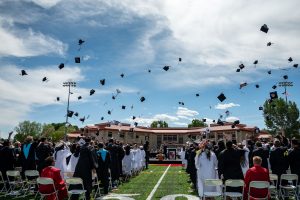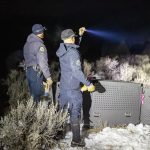Trump administration releases millions in frozen funding for Colorado after-school programs, but districts still face a $60 million gap

Ben Roof/Special to the Daily
The U.S. Department of Education released nearly $1.3 billion in frozen federal funds for before- and after-school programs to schools and organizations across the country on Monday — though over $5.5 billion still remains frozen.
On June 30, the U.S. Department of Education announced it would be withholding roughly $6.8 billion in grant funding from K-12 school districts, which would strip resources from before-and after-school programs, English-learning programs and aid to improve the attainment and graduation rates of immigrant children. For schools in Colorado, that translates to approximately $80 million that were already budgeted.
The Office of Management of Budget confirmed Friday that the part of the frozen funding impacting before- and after-school programs — which had already been approved by Congress and signed into law by President Donald Trump in the spring — would be distributed to the districts and organizations that have been expecting it since July 1.
The released 21st Century Community Learning Centers program funding makes up almost $13 million of Colorado’s $80 million missing from schools, according to Colorado Education Commissioner Susana Córdova. The Trump administration claims the frozen funds were being evaluated to ensure that the way they were spent aligned with the administration’s goals.
“I’m grateful this funding is being returned to its rightful place, in our schools, classrooms and other after-school programs. It should not have been frozen to begin with,” Colorado Gov. Jared Polis said in a written statement. “Without this funding schools, providers, and families faced devastating uncertainty with the beginning of the school year only weeks away.”
The decision is good news for many parents of students on the Western Slope who often have long commutes over the mountains and rely on after-school programs to support their children outside of their regular school hours. These out-of-school programs traditionally provide meals for students throughout the day, including take-home dinners, according to Colorado Department of Education Board Member Kathy Gebhardt, a Boulder Democrat.
The almost $13 million in released funds will also provide some relief to school districts that would otherwise have had to consider other ways to fill the sudden funding gaps — such as reducing program sizes or shrinking their staff for the 2025-26 school year.
But these funds are just the tip of the iceberg. The $5.5 billion in federal funding still frozen means Colorado schools still face a gap of more than $60 million.
“These funds support districts and BOCES to recruit and retain great teachers, counselors, and specialists; implement school-based programs in music, art, and STEM; and provide instructional support for students who are learning English and for the children of agricultural workers,” Cordova said in a written statement about the missing $60 million. “Without the grant funds, schools may face significant cuts to programs and services that families and educators rely on. These programs help ensure every child — no matter where they live — has the opportunity to learn, grow, and succeed.”
After several education leaders expressed it was only a matter of days before districts turned to layoffs and program cancellations pending the release of the $80 million to Colorado schools, the state joined 24 other states in suing the U.S. Department of Education.
Last week, Polis also joined 17 other Democratic governors in writing a letter demanding the release of these funds. The participating states consist of Illinois, Arizona, California, Colorado, Connecticut, Delaware, Kansas, Kentucky, Massachusetts, Michigan, Minnesota, Maine, New Mexico, New York, Oregon, Rhode Island, Washington, and Wisconsin.
“Governor Polis continues to call on the Trump Administration to release the remaining withheld funds which are important for our schools and students. Without certainty over these funds, schools cannot staff classrooms and educators face uncertainty over if they can continue to support Colorado students,” Polis’ team stated in a news release.

Support Local Journalism

Support Local Journalism
As a Summit Daily News reader, you make our work possible.
Summit Daily is embarking on a multiyear project to digitize its archives going back to 1989 and make them available to the public in partnership with the Colorado Historic Newspapers Collection. The full project is expected to cost about $165,000. All donations made in 2023 will go directly toward this project.
Every contribution, no matter the size, will make a difference.










